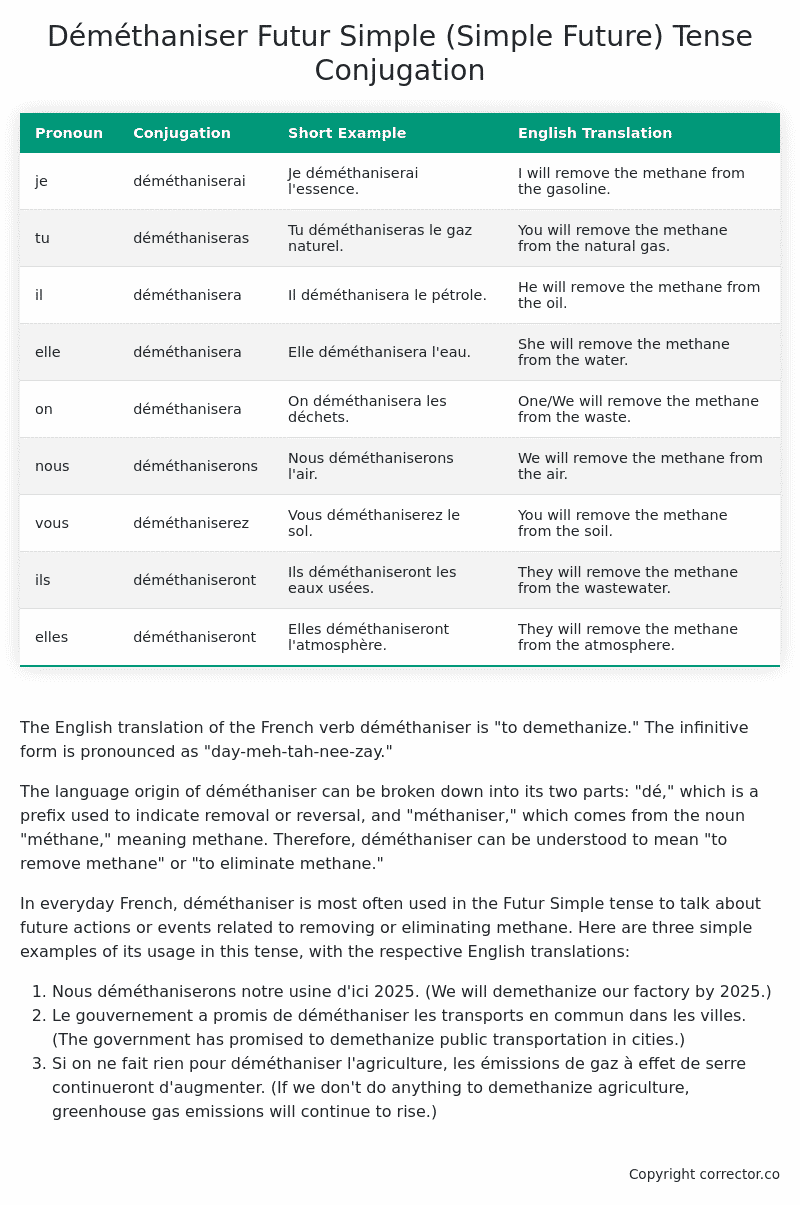Futur Simple (Simple Future) Tense Conjugation of the French Verb déméthaniser
Introduction to the verb déméthaniser
The English translation of the French verb déméthaniser is “to demethanize.” The infinitive form is pronounced as “day-meh-tah-nee-zay.”
The language origin of déméthaniser can be broken down into its two parts: “dé,” which is a prefix used to indicate removal or reversal, and “méthaniser,” which comes from the noun “méthane,” meaning methane. Therefore, déméthaniser can be understood to mean “to remove methane” or “to eliminate methane.”
In everyday French, déméthaniser is most often used in the Futur Simple tense to talk about future actions or events related to removing or eliminating methane. Here are three simple examples of its usage in this tense, with the respective English translations:
- Nous déméthaniserons notre usine d’ici 2025. (We will demethanize our factory by 2025.)
- Le gouvernement a promis de déméthaniser les transports en commun dans les villes. (The government has promised to demethanize public transportation in cities.)
- Si on ne fait rien pour déméthaniser l’agriculture, les émissions de gaz à effet de serre continueront d’augmenter. (If we don’t do anything to demethanize agriculture, greenhouse gas emissions will continue to rise.)
Table of the Futur Simple (Simple Future) Tense Conjugation of déméthaniser
| Pronoun | Conjugation | Short Example | English Translation |
|---|---|---|---|
| je | déméthaniserai | Je déméthaniserai l’essence. | I will remove the methane from the gasoline. |
| tu | déméthaniseras | Tu déméthaniseras le gaz naturel. | You will remove the methane from the natural gas. |
| il | déméthanisera | Il déméthanisera le pétrole. | He will remove the methane from the oil. |
| elle | déméthanisera | Elle déméthanisera l’eau. | She will remove the methane from the water. |
| on | déméthanisera | On déméthanisera les déchets. | One/We will remove the methane from the waste. |
| nous | déméthaniserons | Nous déméthaniserons l’air. | We will remove the methane from the air. |
| vous | déméthaniserez | Vous déméthaniserez le sol. | You will remove the methane from the soil. |
| ils | déméthaniseront | Ils déméthaniseront les eaux usées. | They will remove the methane from the wastewater. |
| elles | déméthaniseront | Elles déméthaniseront l’atmosphère. | They will remove the methane from the atmosphere. |
Other Conjugations for Déméthaniser.
Le Present (Present Tense) Conjugation of the French Verb déméthaniser
Imparfait (Imperfect) Tense Conjugation of the French Verb déméthaniser
Passé Simple (Simple Past) Tense Conjugation of the French Verb déméthaniser
Passé Composé (Present Perfect) Tense Conjugation of the French Verb déméthaniser
Futur Simple (Simple Future) Tense Conjugation of the French Verb déméthaniser (this article)
Futur Proche (Near Future) Tense Conjugation of the French Verb déméthaniser
Plus-que-parfait (Pluperfect) Tense Conjugation of the French Verb déméthaniser
Passé Antérieur (Past Anterior) Tense Conjugation of the French Verb déméthaniser
Futur Antérieur (Future Anterior) Tense Conjugation of the French Verb déméthaniser
Subjonctif Présent (Subjunctive Present) Tense Conjugation of the French Verb déméthaniser
Subjonctif Passé (Subjunctive Past) Tense Conjugation of the French Verb déméthaniser
Subjonctif Imparfait (Subjunctive Imperfect) Tense Conjugation of the French Verb déméthaniser
Conditionnel Présent (Conditional Present) Tense Conjugation of the French Verb déméthaniser
Conditionnel Passé (Conditional Past) Tense Conjugation of the French Verb déméthaniser
L’impératif Présent (Imperative Present) Tense Conjugation of the French Verb déméthaniser
L’infinitif Présent (Infinitive Present) Tense Conjugation of the French Verb déméthaniser
Struggling with French verbs or the language in general? Why not use our free French Grammar Checker – no registration required!
Get a FREE Download Study Sheet of this Conjugation 🔥
Simply right click the image below, click “save image” and get your free reference for the déméthaniser Futur Simple tense conjugation!

Déméthaniser – About the French Futur Simple (Simple Future) Tense
Formation of Futur Simple
For regular -er verbs (e.g., parler – to speak)
For regular -ir verbs (e.g., finir – to finish)
For regular -re verbs (e.g., vendre – to sell)
Common Everyday Usage Patterns
Conditional Statements
Interactions with Other Tenses
Futur Antérieur
Conditional
Present
Summary
I hope you enjoyed this article on the verb déméthaniser. Still in a learning mood? Check out another TOTALLY random French verb conjugation!


